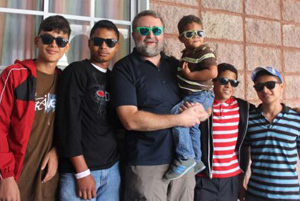

HOME
Who is SRW? SRW Accomplishments Newsletters Contributors Press How You Can Help Contact Us Important Information  Join Us on Facebook Join Us on Facebook |
SRW AccomplishmentsTOO MANY CROSSED EYES
In the country of Honduras, there is only one pediatric eye surgeon and the cost of surgery is something that the majority of the population will never be able to afford. Therefore, the chance for a child to travel to Siguatepeque and have surgery during the week that we are there is, for many, a once-in-a-lifetime opportunity. Strabismus is a condition that involves the alignment of the eyes, usually due to a lack of coordination with the extraocular muscles being able to bring the gaze of each eye to the same point in space and preventing normal vision; it causes a "cross-eyed" appearance in the majority of the people afflicted with this condition. In addition to providing the strabismus surgery, the two certified ocularists that were traveling with the team would be hand-crafting and hand-painting custom prosthetic eyes and scleral shells for the Honduran patients that have lost their eye due to trauma or a type of cancer called retinal blastoma (the treatment of which includes removal of the eyeball). No one in Honduras makes prosthetic eyes. The patients being cared for and treated by the two ocularists have spent the majority of their lives with no eye in their socket, and in rare cases, with no eyes. We arrived in Honduras Saturday afternoon and were driven two hours up into the mountainous region of the country to Siguatepeque. After getting settled into our hotel and having dinner, sleep was necessary as we prepared for the busy day of interviewing and screening patients to determine their eligibility for surgery and other treatments. That night, gunshots (or fireworks) were heard from directly behind our hotel. We each were warned by many people prior to our trip to Honduras about the level of danger we were putting ourselves in by traveling to one of the most dangerous countries in the world at this point in time, and by flying directly into the city with the highest homicide rate in the world. These gunshots, said to be potential warning shots by the security guards that stood vigil at our hotel or another local business every night, were the only noises of violence heard during the entire trip. Overall, we felt very safe during our entire trip. The La Providencia staff was very aware and willing to educate us about the steps we needed to take to be safe in this country. It became very clear, the paramount need for us all to be aware of our safety, when Mary made the statement that, "if anything happened to any of us, we would be shut down. We would not be able to come to this country again, ever." Sunday was screening day. As we pulled through the gates of La Providencia and saw the swarms of people awaiting our arrival, we knew it was going to be a busy day. For the next 12 hours we screened over 50 surgical candidates and the ocularists saw dozens of patients. The stories of the kids, their families and the amount of time and effort it took them to get there will live with all of us forever. The spirit of these people was something that was ingrained in each of us that day. Their humble ability to get through this trying day with grace and patience was something that touched each and every one of us. Later, as we discussed the characteristics of the people we encountered that day, we all agreed that one would be hard pressed to come across a group of people that would be willing to be so patient and humble in the United States. One of the stories that really made an impact was that of a muy guapo (very handsome) 15-year-old boy that came to see us. He had an extreme case of strabismus in one eye and had been given glasses to help his vision. The prescription in the glasses that he wore on a daily basis were doing absolutely nothing to help his vision, and, regardless of what he had been told, they definitely were not doing anything to straighten out the physical appearance of his eye. He and his mother were told by ophthalmologists in Honduras that nothing more could be done for him, but they took a chance after hearing about our group at La Providencia from people in their community and made the seven-hour trek to Siguatepeque. We wereable to get him in for surgery that week, even though there were many surgical patients waiting from the year before. His surgery went very well and he was an extremely pleasant patient in recovery as he quietly sat in bed, covered with a donated handmade quilt and sporting his Wayfarer-style sunglasses from the bag of donated items that each child receives post-operatively. The next day the difference in his appearance was remarkable. His eyes appeared much more straightened in the sockets and he wore a huge smile on his face. As his mother was thanking us over and over again, she had tears streaming down her face and was beaming at her son as though she could see a completely different future for the young man in front of her. It is amazing to think that when this procedure-so common in the United States-is performed on these young Hondurans, it can potentially allow them a future that is so different from the one they may have without it. Allowing a child the confidence that goes with knowing that they are not being judged by peers, teachers and future employers for looking different is worth the efforts, x 100, made to come down to Honduras for this trip and all the hard work and long hours that are worked during the week that we were there. Throughout the week, as surgeries were performed and prosthetic eyes were made and reshaped, a common theme of patience, gratitude and humility wove its way into every aspect of the culture and the work we were doing. It was amazing to be able to allow these children a step-up in a life that is already very challenging for so many reasons. And it is also amazing to take back so many reminders of the many assets that we take advantage of on a daily basis and the rich lives. |
||
New E-mail: mmmdo13@gmail.com • Phone: (608) 445-8503 ©2019 Sharing Resources Worldwide |
|||
 Dr. Rob Bechtel and his five handsome patients
Dr. Rob Bechtel and his five handsome patients